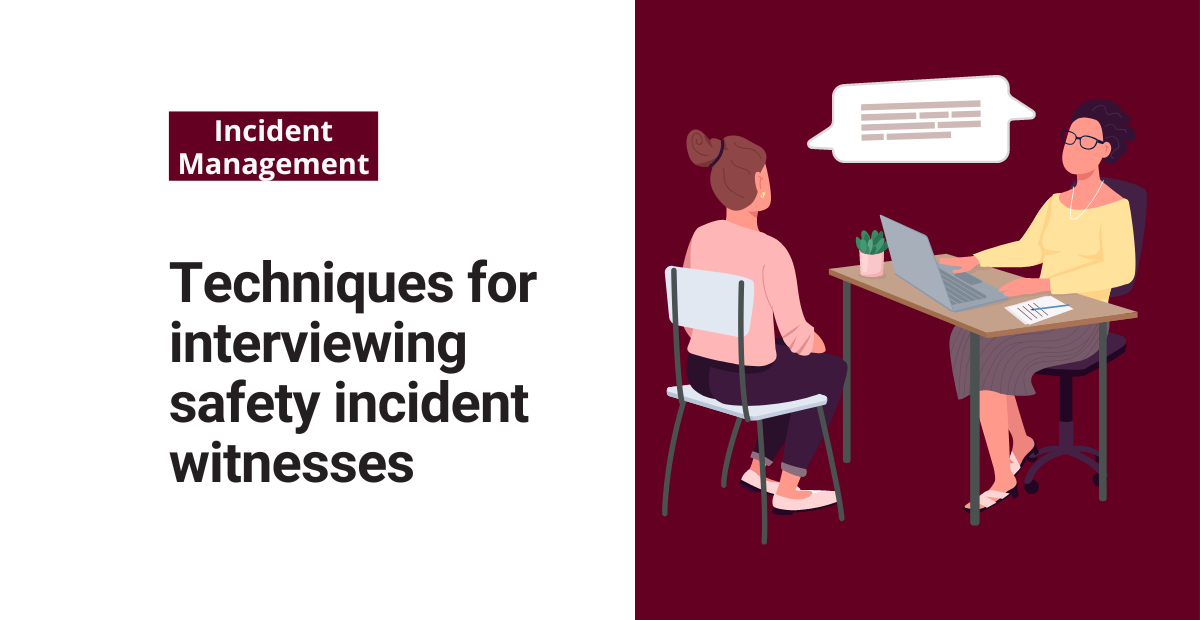When a safety incident occurs, one of the most important things for leadership to do is to conduct interviews with witnesses. Performing the interviews can be a daunting task but there are steps you can take to standardize and simplify the process, removing some of the stress.
Most people are not aware that the outcome of a witness interview can be largely determined by things that happen before it takes place. Follow these witness interviewing techniques to ensure that you get all the information you need for your investigation.
Before interviewing witnesses
All good interviews start with some basic preparation. Oftentimes, you won’t have very much time to brainstorm questions. That’s because safety incident interviews need to happen as quickly as possible.
It’s a good idea to have some ready-made questions that you can tailor to the specific incident. Aside from the questions themselves, here are some other pre-interview boxes to check:
- Let the person being interviewed know why you’re interviewing them.
- Inform the witness that they’re protected from any retaliation because of their statement(s).
- Explain why it’s important that they be as open, honest, and detail oriented as possible.
- Tell witnesses their statement(s) will be kept confidential to the highest degree possible.
- Ask the witness if they have any questions about the interview process before you start.
Many of these techniques are to dispel any nervousness, tension, or stress that the witness may be feeling. Your job is to create an environment where the witness feels comfortable sharing vital information.
After all, their insight is what’s going to help you identify a root cause and prevent the same incident from happening again. Commit yourself to making witnesses feel supported throughout the process. This will pay off when you collect all the facts you’re hoping to uncover.
During the witness interview
Once the interview begins, there are many things that you as the interviewer can do to achieve a positive outcome. One important thing is to remember that your role is not to provide information.
Interviewers should not share information from interviews or their opinions about the situation with anyone outside of the investigation. They should also avoid using negative language or doing anything to make the witness feel intimidated.
Lastly, interviewers should use open-ended questions to cover the basics of who, what, when, where, why, and how.
Here are some tips to follow during the interview:
- Maintain control by asking questions and not getting drawn into answering them.
- Don’t offer any opinions about the incident or the people involved.
- Keep your questions simple, straightforward, and direct.
- Restate important questions a few times to ensure you’re getting consistent information.
- Take notes throughout the interview (in addition to getting a written statement).
- Before ending the interview, provide a recap of what the witness has said.
- Ask the witness to reach out to you with any additional information.
Although these witness interviewing techniques may seem easy, don’t be fooled. In the moment, it can be difficult to remember a standard approach. This is especially true if you don’t have much experience conducting interviews.
Take your time to ensure that you’re getting all the information you need now. The last thing you want is to move forward with the accident investigation only to realize you’re missing a key piece of information.
Keep this list of techniques handy for the next time you have to prepare for an interview. This will help guide your investigation and produce the quality outcome you want.
Other posts you might like…
No posts

